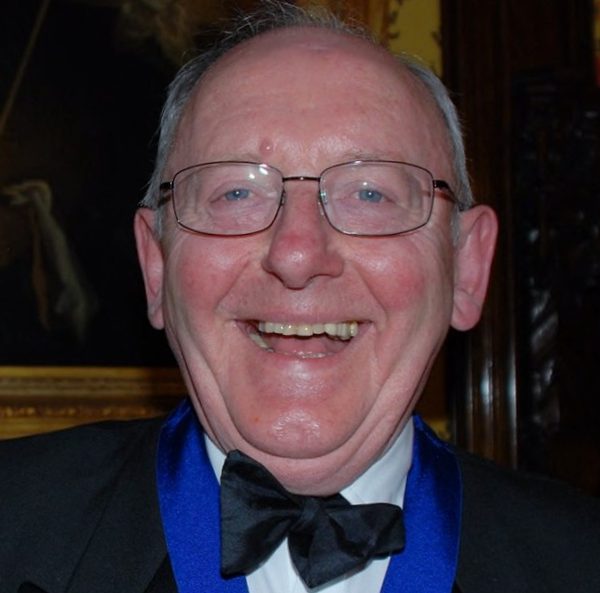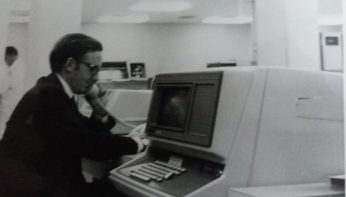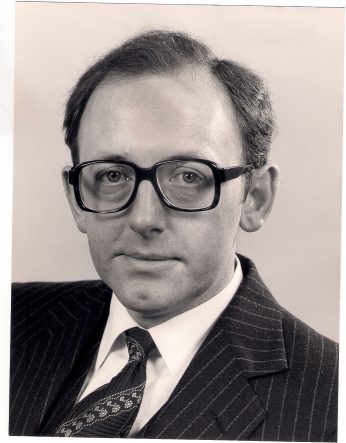
“Whatever you choose to do, whatever you think you might do in the long term, you’ve got to build your career on a bedrock of competence in some field. It doesn’t matter what field, but you have to be really good at something before you start moving off.”
Geoff was born in Prestatyn, on Christmas Eve 1941. He was born there because his mother was evacuated from Liverpool after the Royal Liverpool hospital was bombed. However, they went back to Liverpool within ten days, and Geoff started life in his grandfather’s pub on the Pier Head. After his Grandfather died, the family moved to an area called Aigburth and he was brought up there. His parents went on to have six more children, and he thinks that being the oldest child made him acquire a sense of responsibility
Geoff went to the local primary school, and then to St. Edward’s, a Christian Brothers school, also in Liverpool. He was diverted into the art stream very early on and although he took maths GCE to matriculate he took no science subjects after the age of fifteen. His main interest was in English and languages with his highest marks being for Latin.
He went to Liverpool University from 1960 – 1963, largely because he decided he didn’t want to do third year of sixth form and found he could get into Liverpool late. He read English, because he had a view of becoming a teacher, but lost interest in that during his degree. Although it turned out that it was not the right course to have done it did give him his first introduction to computing as he spent two terms working occasionally with the computer laboratory on a project that could have benefited his dissertation. It turned out to have been a waste of time and he had to write 50 per cent of his work for two terms in a week, which helped him get a very bad degree.
When the Appointments Board held a session for people who hadn’t yet made up their mind what to do, and asked if anybody had any experience of computing, he was the only Arts faculty student who put his hand up. The effect of that was that he had a day of aptitude tests with the firms who became ICL, as well as with NCR and IBM; he took five aptitude tests, and passed them all. The next day he had five interviews, and that evening had four job offers. He took the one based in London
Geoff took a six-month graduate trainee course in London with NCR. In the background, he did a lot of catching up on Maths with some friends who were mathematicians, so he could understand half the stuff he was being taught. He then became a programmer/analyst in pre- and post-sales support. After the first couple of years he was quite keen to stay in the general technical areas. However, in 1965 Geoff was moved, with his peer group, into sales. He took an NCR sales course and tried the work for six months, but didn’t find it very interesting, or attractive. So, in February 1966 he left, and joined CEIR. Whilst there he got engaged to his wife who was then a mathematician for CEGB, writing FORTRAN programs for project management and related things. Geoff left CEIR after they were taken over by BP, and stopped even trying to sell projects. He left and joined Babcock & Wilcox, which was a tremendous environment, as an analyst, and put in a couple of systems. His department was told it was moving to Glasgow and Geoff and his wife decided they didn’t want to move.
On April 1st, 1968 Geoff joined UNIVAC to specialise in the support of DMS 1100, which was their database system. He worked for roughly eighteen months, based in Hemel Hempstead, supporting Shell-Mex and BP. He was then approached by Xerox Data Systems to become their technical support head. He told UNIVAC about this, they offered him a job as support for large systems in Spain.


Geoff spent twenty years at Shell; his career was in the newly-formed Shell UK for the first eight years. Then he had three and a half years in Shell International heading a unit to support operating companies round the world before coming back to the Shell UK/Exxon joint venture, Expro, for just over three years as director of computing and administration.
He then went back to International, had a bit of a medical misfortune and finally came back to the UK and then Northern Europe, where he was CIO for three years. Geoff took early retirement in 1993 intending to stop working. But his wife, who had just decided to give up what she had been doing in IT and retrain as a maths teacher, wasn’t planning to be at home, and he didn’t relish the thought of being home alone. So, for three years he worked freelance as a consultant.
In August 1997 Geoff was approached to become Chairman of UKERNA, which was a quango running JANET(UK). After some discussion, he became Managing Director for three years, then executive Chairman for a further two. For the first year he put in place processes that ran the business effectively. The next task , for JANET to survive, was to align the structure of governance and the funding. The funding came from various funding bodies, nine in total, who had no part in the governance, because UKERNA was a company limited by guarantee with 2,000 academic members. So, he spent his last eighteen months doing presentations to regional assemblies, telling them they had to vote to change the Memorandum and Articles of Association to permit the funding bodies to be in charge of the company for JANET to survive, which they duly did.
He then moved to run the University of London Computer Centre for three years.
The governments led by John Major and Tony Blair were very concerned about the repeated failure of large public projects, principally but not exclusively in computing. The Cabinet Office was charged with seeking a generally applicable solution and developed the Gateway process, which divided projects into stages and required a demonstration towards the end of each stage that the project was ready to move on to the next. The assessment of the project’s condition was carried out by a team of people from outside the department carrying out the project, using Civil Servants and external consultants. Geoff was recruited as a High-Risk team leader for Gateway reviews and carried out some 20 between 2006 and 2010
Geoff joined the board of the IT NTO, the National Training Organisation in 1992 and became its Chairman. In 1997 they set up a body called AISS, the Association for[sic] Information Systems Skills, which included BCS, IT NTO, IEE, and IMIS. Out of that came SFIA, the Skills Framework for the Information Age, and a foundation to run it, which still exists. The framework is used globally for IT skills analysis and has been very successful.
Geoff recalls there was a very serious rumour going around in 1966 that computing was about to become a regulated profession. So, he was one of lots of people who joined the BCS and paid their three guineas a year in order to be in on the ground floor of that. He was active in a couple of Specialist Groups in the 1970s.
The end of 1981 was when Geoff’s main connection with the BCS started. He was part of a group in Shell who were trying to develop a skills framework and career development framework at IT. Shell had them for every other specialisation, and the group was charged with producing one for IT. They adopted a BCS product called the Professional Development Scheme. This led to Geoff becoming more involved with BCS and being vice President for Professional Formation for eight years from 1994.
In 2001 Geoff became BCS President and continued the work of his preceding Presidents to get the governance structure of the BCS changed. He also wanted to improve the way that the BCS supported disabled people, because he was underwhelmed by the amount they do to support the use of computing by the disabled. He is still a member of the specialist group.
After his year as president Geoff was appointed the BCS’s representative to CEPIS and the ECDL Foundation,. He was President of CEPIS for two years and a Director of the ECDL foundation for four.
In 2010, Geoff was invited by David Clarke to the industry awards dinner as a guest, and when he was there found he had received the Outstanding Contribution to IT Award. He felt very touched by that. He thought the citation was really very good and was very moved.
He has also been awarded a D. Tech by the University of Wolverhampton.
Geoff thinks the present structure of the IT industry is not sustainable. The largest Web based companies – Facebook, Amazon, Google and so forth, typically have P/E ratios four or five times the average in the market. That’s not going to endure. What the eventual market correction might do to those companies, he doesn’t know but feels it’s a very real threat.
Secondly, he thinks, the whole business of encryption and privacy is going to suffer some major shocks. He doesn’t think governments are going to allow the activities of actual or potential criminals to be hidden from their view for very much longer. So, he thinks there’s going to be an awful lot of activity in courts over the next, say five years.
Geoff thinks a lot of the protagonists of AI are just like their predecessors over the years; prone to exaggeration. He thinks the future of AI is, is a really interesting topic, and, in certain fields:- data mining, and autonomous vehicles, itis very useful. But these are limited applications. People need to distinguish Artificial Intelligence from Artificial Consciousness, which is a bigger and harder nut to crack.
Whatever you choose to do, whatever you think you might do in the long term, you’ve got to build your career on a bedrock of competence in some field. It doesn’t matter what field, but you have to be really good at something before you start moving off.
You need to remember that in computing and IT, just as in any other field, you need to tell the truth, and do what you promise. You’ve got to be ethical.
Respond to opportunity when it comes and knocks on your door, because it never does it again and you’ve got to work hard.
Interviewed by: Jonathan Sinfield on the 6th June 2017 at the London Office of BCS
Transcribed by: Susan Hutton
Abstracted by: Annabel Graham